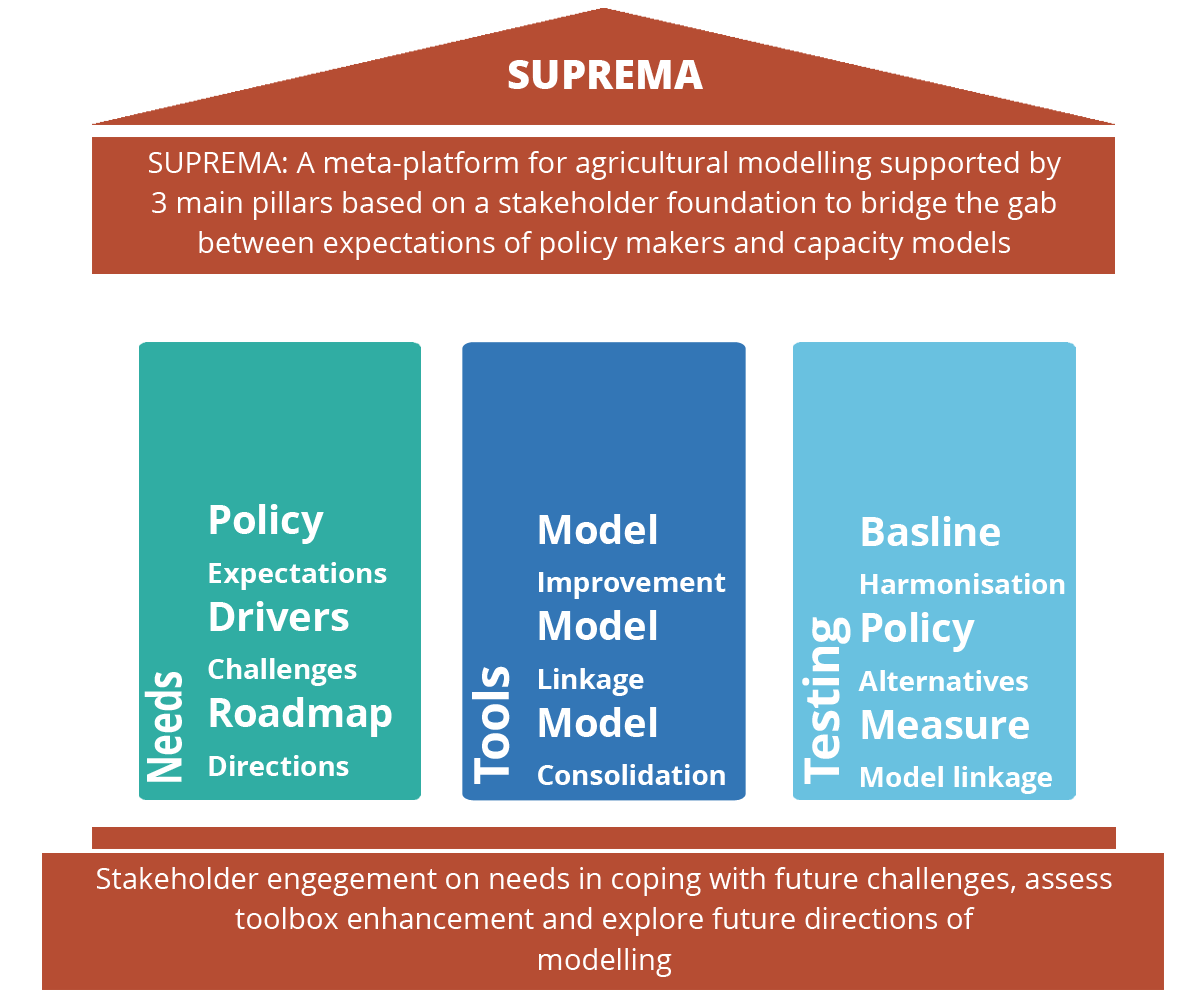Support for Policy Relevant Modelling of Agriculture (SUPREMA) comes to address these challenges by proposing a meta-platform that supports modelling groups linked already through various other platforms and networks. SUPREMA should help close the gaps between expectations of policy makers and the actual capacity of models to deliver relevant policy analysis, addressing societal challenges towards European agriculture (climate change and low carbon economy, circular economy, land use, SDGs). The SUPREMA model family includes a set of ‘core models’ that are already extensively used in support of key European impact assessments in agriculture, trade, climate and bioenergy policies. The models are policy relevant and offer the perspective for improvements individually and especially as a linked system to cover a broad range of existing and newly emerging topics. The meta-platform, the enhanced linked system of existing core models and some key applications melt down in a roadmap for future directions for agricultural modelling in Europe.
Several integrated model platforms are currently operational at the EU and global level (e.g. iMAP, AgMIP, MACSUR and GRA). While such platforms exist, there is insufficient modelling capacity and coordination to understand the challenges facing agriculture and the impacts of policies, including a lack of ground work on modelling alignment (i.e. rigorous comparison of model parameters and results) and streamlining of methods.
 Meta-platform supported by three pillars
Meta-platform supported by three pillars
SUPREMA is expected to increase and improve the capacity of existing models to answer the new policy questions, therefore better meeting the expectations by policy makers. The project has four coherent objectives which respond to key operational challenges of the call:
- A SUPREMA roadmap of future directions for modelling will be developed. The needs for improving the capacity of current models or a linked system of models to deliver on an increasing variety of policy objectives are defined. This science-policy interaction will bridge the gap between the expectations of policy makers and the capacity of models in a more complex environment by improving the mutual understanding and clarifying research needs and feasible strategies.
- An enhanced and strengthened SUPREMA model family will be created. The performance and capacity of current models, individually and as a linked system, will be enhanced in a few focus areas for integrating new policy challenges (e.g. climate change, SDGs, supply chains). The capacity of the modelling network will be strengthened by an enhanced infrastructure for database improvements and model interaction, strengthening of existing and establishing new linkages among models, targeted technical improvements and consolidation activities (i.e. model testing and versioning).
- Future directions of modelling in agriculture will be explored and tested through scenario applications involving the SUPREMA models in a coordinated fashion. The testing will enable a better understanding of the functioning of the SUPREMA model family and the EU agricultural sector at different spatial scales (e.g. European, national, regional and farm level) for different applications. A baseline and two selected policy case studies will be implemented to showcase the potential and limitations of the model suite to represent different scales of agriculture, various agricultural activities, different aspects of upstream and downstream sectors, bilateral trade and multiple policies affecting agriculture directly or indirectly.
- A SUPREMA meta-platform will be established, to share and discuss the findings of the work with existing model platforms, research communities, and policy makers. The SUPREMA meta-platform will be open towards existing platforms and policy makers and will host three science-policy workshops to discuss existing capacity in modelling agriculture, identify the needs for modelling and explore future directions for modelling .
